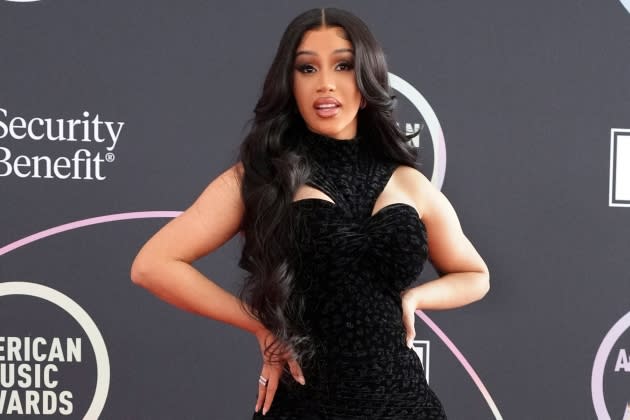Blogger Appeals Cardi B’s $4 Million Defamation Award. Expert Gives It ‘Slim Chance’
- Oops!Something went wrong.Please try again later.

Embattled blogger Tasha K has followed through on her vow to appeal Cardi B’s whopping $4 million defamation award, and the 45-page opening brief filed this week is a piece of work.
The lawyers who submitted it even told the Eleventh Circuit Court of Appeals they weren’t requesting a chance to argue its merits in person, writing that “the decisional process would not be significantly aided by oral argument.”
More from Rolling Stone
Hack a Bitch: Bella Poarch Claims Trolls Are to Blame for Anti-Cardi B Tweets
'It's Showtime': Judge Tees Up Cardi B Trial in $5 Million Suit Over 'Sexual' Cover Art
Offset Wins Another Round: $1 Million Lawsuit Over Missing Bentley Dismissed in L.A.
Tasha K, whose real name is Latasha Kebe, argues in the filing that Cardi’s January jury verdict should be overturned on various grounds, including Kebe’s simple assertion that she believed Cardi B had herpes when she made the false statement about the STD to her online audience.
“That’s a head-scratcher,” Michael Overing, a lawyer and adjunct professor at USC Annenberg who specializes in defamation and First Amendment law, tells Rolling Stone. “So when I allege that you had a loathsome disease, since I believed it to be true, you don’t get to sue? That makes no sense. That makes no sense at all.”
Overing also challenged the new appeal’s assertion that it’s “impermissible to use a defendant’s hatred, spite, ill will, or desire to injure as evidence of actual malice.”
“The defendant’s spite and ill will are not evidence of malice? What is it evidence of, if it’s not evidence of malice?” he asks with a laugh.
“I think it has a pretty slim chance of prevailing,” Overing says of Kebe’s overall appeal. “She’s got a right to appeal. But everything I saw showed that she got a fair trial. It was pretty clear that the things she said about Cardi were motivated by malice and spite, and she did them solely to increase her (audience). Because of that, she wasn’t really believable.”
Cardi’s legal team declined to comment on the appeal Wednesday.
The Grammy-winning rapper, whose legal name is Belcalis Marlenis Almánzar, won her $4 million verdict in January after a jury sided with the “WAP” singer on her three claims of defamation, invasion of privacy, and intentional infliction of emotional distress.
After the verdict, a federal judge in Georgia ordered Kebe to scrub from the Internet more than a dozen defamatory videos and several social media posts in which Kebe referred to Cardi in offensive ways, calling her names such as “Cold Sore B” and “cokehead.”
Cardi filed the underlying libel and defamation lawsuit in March 2019. Taking the witness stand to plead her case at trial, Cardi told the jury that she suffered extreme “anxiety” and “depression” after Kebe posted YouTube videos with the false statements. She said the severe stress caused her weight to fluctuate and led to issues in her personal relationships, a courtroom source told Rolling Stone.
In her new appeal brief, Kebe continues to argue that she never posted anything with “actual malice.” She and her lawyers also claim the trial court judge erred by prohibiting Kebe from presenting certain evidence about Cardi’s alleged “character.”
“The district court’s erroneous exclusion of plaintiff’s character evidence resulted in a very lopsided presentation of evidence to the jury. Because the jury did not get to learn the type of conduct plaintiff engages in or who the plaintiff truly is as a person, the jury returned a general verdict for the plaintiff,” the new filing states.
Overing questioned this assertion as well on Wednesday. He says the question at the heart of the trial was whether Cardi’s reputation was harmed by false statements — not Cardi’s character.
“Here’s the thing: when you say something about a person having a loathsome disease, it is presumed harmful to their reputation,” he says. “So now the burden really is on the defendant to either prove ‘truth’ or prove that there was no harm to the reputation.”
He says Kebe’s simple argument that Cardi B’s celebrity has continued to rise “doesn’t go very far.”
“You would have to demonstrate through admissible evidence that no one shunned her, no one made fun of her, no one refused to be seen with her, no one refused to go out with her. That would be the kind of evidence that would be admissible,” he says, and Kebe failed to convince the jury of that.
Best of Rolling Stone
